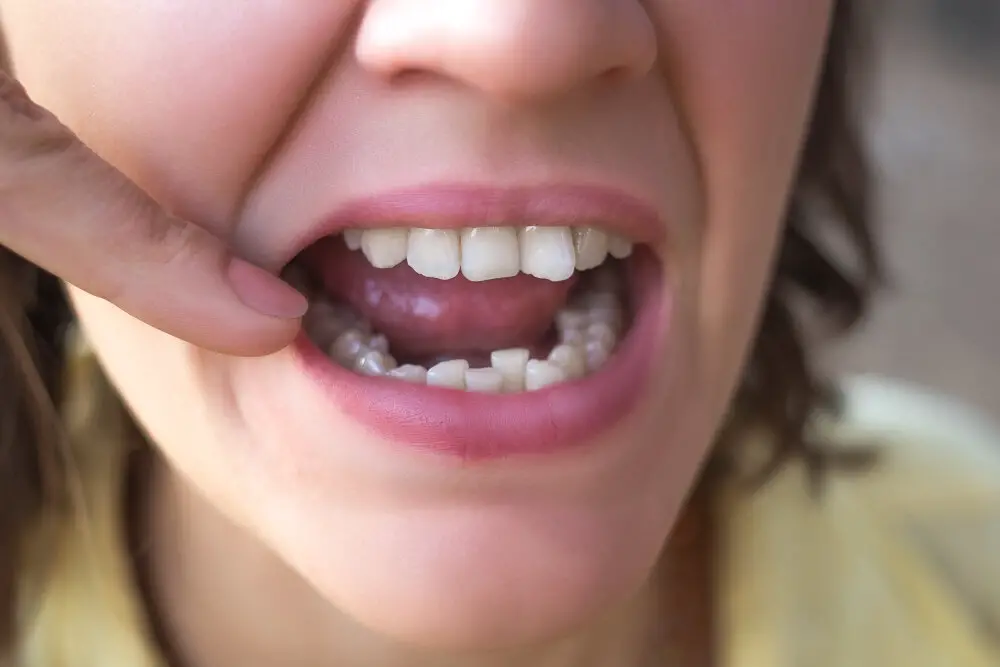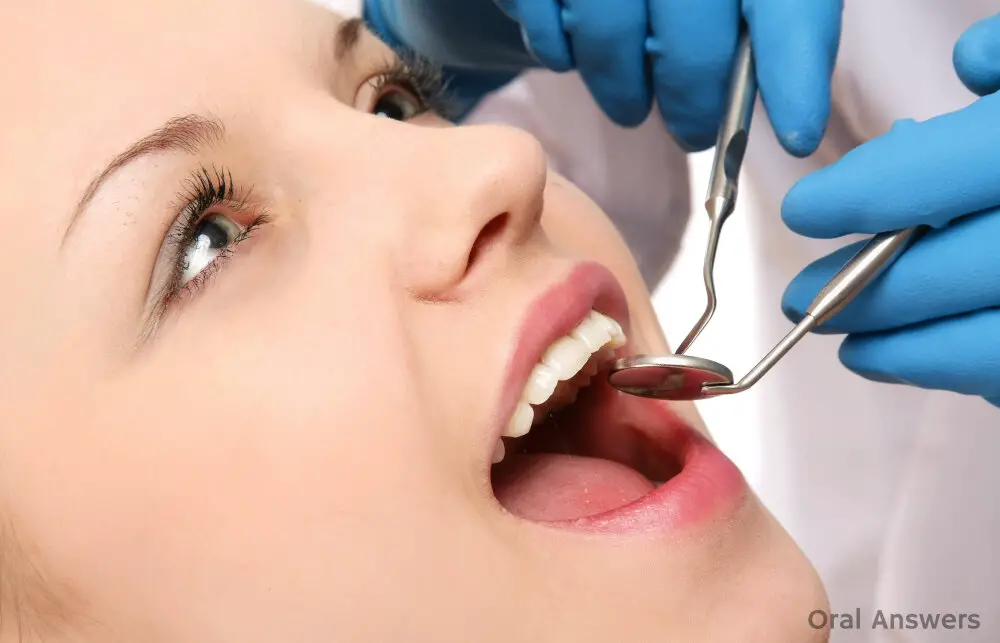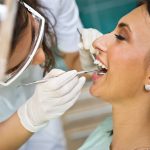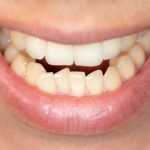Guinea Pig Teeth: How Many Do They Have and How to Keep Them Healthy

Guinea pigs are adorable small animals that make great pets for many people. They are known for their gentle nature and cute appearance, with their round bodies and soft fur. However, taking care of a guinea pig requires a lot of work and attention, especially when it comes to their dental health. Guinea pigs have unique teeth that need to be taken care of properly, or else they can develop dental problems that can cause pain and discomfort. Guinea pigs have a total of 20 teeth, with 4 incisors at the front of their mouth and 16 molars at the back. Their teeth continuously grow throughout their life, which means they need to wear them down by chewing on hay, grass, and other rough foods. If their teeth become overgrown, they can develop painful dental problems such as malocclusion, which can make it difficult for them to eat and drink. Therefore, it is essential to provide them with a healthy diet and regular dental check-ups to ensure their teeth stay healthy.
Guinea pig teeth are unique and fascinating, with a total of 20 teeth in their mouth. These teeth are categorized into two types: incisors and molars. The four incisors are located at the front of the mouth and are used for cutting and grasping food, while the back molars help grind up the food for digestion. Guinea pigs have continuously growing teeth, which means they require constant wear to prevent overgrowth and other dental issues. Owners should provide their guinea pigs with a balanced diet rich in hay and other fiber-rich foods to help keep their teeth healthy and prevent dental problems.
Maintaining healthy teeth is crucial for guinea pigs as they rely on them for a variety of functions including eating, grooming, and even defending themselves. Guinea pig’s teeth grow continuously throughout their life, and if they are not worn down properly, they can develop dental problems such as overgrown teeth, malocclusion, and spurs. These issues can cause pain and discomfort, making it difficult for guinea pigs to eat and can lead to serious health problems such as weight loss and infections. To keep their teeth healthy, providing a balanced diet with plenty of hay and vegetables to chew on is essential, along with regular vet check-ups and dental care if needed.
How Many Teeth Do Guinea Pigs Have?

Guinea pigs have a unique set of teeth that are constantly growing and need proper care to maintain their health. These small rodents have a total of 20 teeth, including four incisors at the front of their mouth, which are used for biting and cutting food. The incisors are followed by a gap, known as the diastema, which helps to grind food and break it down into smaller pieces. Behind the diastema, guinea pigs have four molars on each side of their mouth, which are used for grinding and chewing food. It is essential to keep your guinea pig’s teeth healthy and well-maintained to prevent dental problems, which can lead to pain and discomfort. Guinea pig teeth grow continuously throughout their life, and if they are not worn down properly, they can become overgrown, causing dental malocclusion. To keep your guinea pig’s teeth healthy, provide them with a diet rich in hay, fresh vegetables, and fruits, which helps to wear down their teeth naturally. Additionally, providing your pet with chew toys, such as wooden blocks or branches, can help to keep their teeth in good condition by providing a natural way to grind down their teeth.
Guinea pigs are herbivorous animals and their dental anatomy is adapted accordingly. They have a unique set of teeth consisting of 20 teeth in total, with 4 incisors and 16 molars. The incisors are located in the front of their mouth and are used for cutting and grasping food. These teeth continue to grow throughout their life, so it’s crucial to provide them with proper chewing material to wear down their teeth naturally. The molars are located in the back of their mouth and are used to grind and chew food. Unlike the incisors, the molars do not grow continuously, but they can still become overgrown if the guinea pig’s diet is not adequately fibrous. Therefore, it’s essential to provide a well-balanced diet consisting of hay, vegetables, and fruits to ensure their dental health.
Guinea pigs are known for their adorable features and unique characteristics, including their teeth. These furry creatures have a total of 20 teeth, which consist of 4 incisors and 16 molars. The incisors are located at the front of their mouths and are used for biting and cutting food, while the molars are located at the back and are used for grinding and chewing. It is essential to keep their teeth healthy and well-maintained as they continuously grow throughout their lives. Neglecting their dental care can lead to a range of health problems, including dental disease, malnutrition, and even death. Therefore, it is crucial to provide them with a healthy diet, chew toys, and regular check-ups to ensure their teeth remain in good condition.
Guinea pigs, like most mammals, have different types of teeth, each with a specific function. They have four incisors at the front of their mouth, which are used for cutting and biting food. Behind the incisors, they have a gap known as the diastema, which separates the incisors from the molars. Guinea pigs have two types of molars: premolars and molars. The premolars are located near the front of the mouth and are used for grinding and crushing food, while the molars are located at the back of the mouth and are used for grinding and shredding. Guinea pigs’ teeth grow continuously throughout their life, which means that they need to chew on hard objects to keep their teeth healthy and prevent overgrowth.
Why Do Guinea Pig Teeth Need to Be Kept Healthy?

Guinea pig teeth need to be kept healthy because they play a crucial role in their overall health and well-being. Guinea pigs are herbivorous animals that rely on their teeth for chewing and grinding their food. Their teeth grow continuously throughout their lives, and if they become overgrown or misaligned, it can lead to serious health problems. Overgrown teeth can cause a range of issues for guinea pigs, including difficulty eating, weight loss, and even starvation. Misaligned teeth can also cause pain and discomfort, leading to a decrease in appetite and overall lethargy. In severe cases, dental issues can lead to abscesses, infections, and even death. Therefore, it’s essential to keep guinea pig teeth healthy by providing them with a proper diet, regular dental check-ups, and dental care if necessary. By doing so, you can ensure that your beloved pet remains healthy and happy for years to come.
Guinea pigs are fascinating creatures that have a unique dental structure. Unlike humans, guinea pigs have open-rooted teeth that grow continuously throughout their lifetime. The reason behind this is that guinea pigs have a diet that is high in fiber and low in calcium, which wears down their teeth quickly. Therefore, their teeth need to grow continuously to compensate for the wear and tear. If their teeth do not grow properly or become too long, it can lead to various dental problems, such as overgrown teeth, malocclusion, and even death. Therefore, it is crucial to provide guinea pigs with a proper diet, chew toys, and regular dental checkups to maintain their oral health.
Guinea pigs are herbivorous animals, which means their teeth are vital for their survival. However, their continuously growing teeth can cause dental problems if not properly taken care of. One of the most common issues is malocclusion, a condition where the upper and lower teeth don’t meet correctly, causing overgrown teeth, difficulty eating, and weight loss. Another issue is dental abscesses, which occur when food or debris get stuck in the teeth, leading to painful and infected pockets. Moreover, dental problems can also cause a lack of appetite, drooling, and teeth grinding, indicating that your guinea pig needs immediate veterinary attention to avoid further complications. Therefore, regular check-ups, proper diet, and chew toys are essential to keep your guinea pig’s teeth healthy.
Neglecting dental health can have dire consequences, not only in Guinea Pigs but also in humans. Poor oral hygiene can lead to a host of dental problems, ranging from minor gum inflammation to severe gum disease, tooth decay, and tooth loss. Tartar buildup and cavities can cause bad breath and make it difficult to eat, which can ultimately lead to malnutrition. Furthermore, untreated dental issues can spread to other parts of the body, causing infections and even organ damage. Regular dental checkups, proper brushing, flossing, and a healthy diet are all essential components of maintaining good dental health and preventing potential health problems down the road.
How to Keep Guinea Pig Teeth Healthy

Guinea pigs have a set of teeth that never stop growing. This means that they require constant care to keep them healthy and strong. In order to keep your guinea pig’s teeth in top shape, it is important to provide them with a healthy diet consisting of hay, fresh vegetables, and fruits. These foods help to wear down their teeth and prevent overgrowth. Additionally, you can give them a variety of chew toys to gnaw on. These toys can be made of wood, cardboard, or even hard plastic. Chewing on these toys will help to keep their teeth healthy and strong. It is also important to keep an eye on your guinea pig’s teeth and schedule regular check-ups with a veterinarian. Your vet can monitor the health of their teeth and determine if any dental procedures are necessary. Some common dental problems in guinea pigs include overgrown teeth, tooth abscesses, and malocclusion. If left untreated, these issues can lead to pain, infection, and even death. By keeping your guinea pig’s teeth healthy and seeking veterinary care when necessary, you can ensure that your furry friend lives a happy and healthy life.
Proper diet and nutrition play a crucial role in maintaining good dental health in guinea pigs. A diet high in vitamin C, fiber, and calcium is essential for healthy teeth and gums. Guinea pigs should be fed a variety of fresh vegetables, fruits, and hay, as well as a small amount of pellets, to ensure they receive all the necessary nutrients. Chewing on hay and other fibrous materials also helps to wear down their continuously growing teeth and prevent overgrowth. Avoid feeding them sugary or starchy foods, as they can contribute to tooth decay and other dental problems. Providing clean drinking water and regular dental checkups by a veterinarian can also help maintain optimal dental health in guinea pigs.
Hay and chewing toys are essential for the health and well-being of guinea pigs. Hay provides the necessary fiber that helps maintain a healthy digestive system and keeps their teeth in good condition. Guinea pigs have constantly growing teeth, which require regular wear down to prevent overgrowth and dental problems. Chewing toys such as wooden blocks or sticks, help keep their teeth trimmed and healthy. Without adequate hay and chew toys, guinea pigs can develop dental issues, which can cause pain, difficulty eating, and other health problems. Therefore, it is crucial to ensure that your guinea pig has access to high-quality hay and a variety of safe chewing toys to maintain their oral health.
Regular dental checkups and teeth trimming are essential for the health and well-being of guinea pigs. Guinea pigs have continuously growing teeth that need to be regularly filed down to prevent overgrowth and other dental problems. During these checkups, a veterinarian will examine the guinea pig’s teeth and trim them if necessary. Neglecting dental care can lead to malocclusion, a painful condition where the teeth don’t meet properly, making it difficult for the guinea pig to eat. Additionally, if the teeth are left to overgrow, it can cause damage to the gums and even lead to tooth loss. Therefore, it is vital to ensure your guinea pig receives regular dental checkups and teeth trimming to maintain their overall health and well-being.
It’s important to keep a close eye on your guinea pig’s dental health, as dental issues can lead to serious health complications. Signs of dental problems include a loss of appetite, weight loss, drooling, and difficulty eating or chewing. You may also notice your guinea pig grinding their teeth or exhibiting other signs of pain. If you suspect your guinea pig is experiencing dental problems, it’s important to seek veterinary care as soon as possible. A veterinarian will be able to examine your guinea pig’s teeth and provide treatment options, which may include trimming overgrown teeth or prescribing medication to alleviate pain and inflammation. Don’t wait to seek veterinary care if you notice any signs of dental problems, as early intervention can prevent more serious issues from developing.
Maintaining good dental health is crucial for guinea pigs. These adorable little creatures rely on their teeth for various activities such as eating, grooming, and burrowing. Guinea pigs have constantly growing teeth, so they need to gnaw on hard foods and chew toys to prevent overgrowth and maintain proper alignment. Dental issues like malocclusion, which is a misalignment of the teeth, can lead to severe health problems and even death if left untreated. As a responsible pet owner, it is essential to monitor your guinea pig’s teeth regularly and provide them with a balanced diet that includes hay, fresh vegetables, and fruits. Regular veterinary check-ups can also help identify any dental issues early on and prevent them from progressing into more severe problems. By taking good care of their teeth, you can ensure that your guinea pig enjoys a long and healthy life.
The article titled \Guinea Pig Teeth: How Many Do They Have and How to Keep Them Healthy\ provides vital information about the dental health of guinea pigs. The author explains that guinea pigs have four incisors and twenty molars in their mouths, which are essential for grinding and chewing their food. The article also highlights the importance of maintaining good dental hygiene for guinea pigs, as dental problems can lead to serious health issues. The author suggests providing a healthy diet consisting of hay, fresh vegetables, and fruits, as well as providing chew toys to help wear down their constantly growing teeth. Additionally, the article recommends taking your guinea pig to the vet for regular check-ups to ensure their dental health is in optimal condition. Overall, the article emphasizes the significance of proper dental care for guinea pigs to maintain their overall health and well-being.
Guinea pig owners, it’s time to prioritize your pet’s dental health! These adorable creatures have unique teeth that continuously grow throughout their lives, and if not properly maintained, can lead to serious health issues. Regular check-ups with a veterinarian who specializes in guinea pigs can help detect any dental problems early on. Additionally, providing a balanced diet rich in hay and fresh vegetables can help wear down their teeth naturally and prevent overgrowth. Don’t overlook your furry friend’s dental health – make it a top priority to ensure a long and happy life for your beloved guinea pig.
Conclusion

In conclusion, the dental health of guinea pigs is of utmost importance to their overall wellbeing. These adorable creatures have 20 teeth that need to be regularly maintained through proper diet and chew toys to prevent overgrowth, malocclusion, and other dental issues. A well-balanced diet high in vitamin C is crucial for guinea pig dental health, and they should have access to hay and chew toys to keep their teeth healthy and strong. Regular check-ups with a veterinarian can also help identify any dental problems early on. By implementing these tips and tricks, guinea pig owners can ensure their furry little friends have healthy, happy teeth for years to come.





